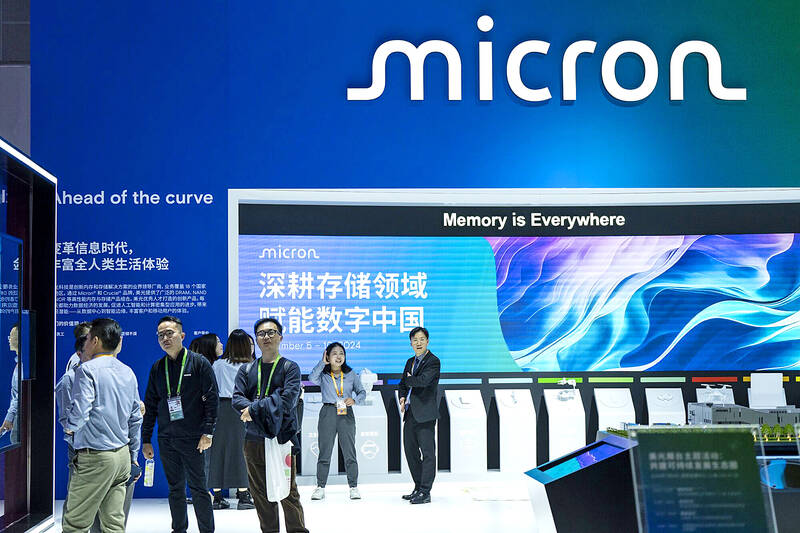US President Joe Biden’s administration yesterday finalized up to US$6.2 billion in funding for Micron Technology Inc, firming up a deal to boost domestic semiconductor production before Donald Trump returns to the White House.
The Biden administration has been working to green-light agreements with firms in the chipmaking supply chain over recent months, seeking to cement parts of his legacy before the government administration changes.
Once a deal is finalized, funds can start heading to companies when they hit certain milestones.

Photo: Qilai Shen, Bloomberg
The Micron investment helps to bring development and production of advanced memory semiconductor technology to US shores, US Secretary of Commerce Gina Raimondo said.
This “is crucial for safeguarding our leadership on artificial intelligence and protecting our economic and national security,” she added in a statement.
The United States has been trying to reduce its dependence on China and other countries for semiconductors.
The latest funding comes under the CHIPS and Science Act, a major law passed during Biden’s term aimed at strengthening the US semiconductor industry.
The Micron deal in particular supports the company’s two-decade plan to invest some US$100 billion in New York and US$25 billion in Idaho, the US Department of Commerce said.
This should create some 20,000 jobs and “help the US grow its share of advanced memory manufacturing from less than two percent today to approximately 10 percent by 2035,” the department added.
Apart from the efforts in New York and Idaho, the commerce department also signed a preliminary agreement with Micron for up to US$275 million in proposed funding to expand and modernize its facility in Virginia.
“As the only US-based manufacturer of memory, Micron is uniquely positioned to bring leading-edge memory manufacturing to the US,” Micron president Sanjay Mehrotra said in a statement.
The US used to make nearly 40 percent of the world’s chips but this proportion is now around 10 percent, with none being the most advanced chips.

MULTIFACETED: A task force has analyzed possible scenarios and created responses to assist domestic industries in dealing with US tariffs, the economics minister said The Executive Yuan is tomorrow to announce countermeasures to US President Donald Trump’s planned reciprocal tariffs, although the details of the plan would not be made public until Monday next week, Minister of Economic Affairs J.W. Kuo (郭智輝) said yesterday. The Cabinet established an economic and trade task force in November last year to deal with US trade and tariff related issues, Kuo told reporters outside the legislature in Taipei. The task force has been analyzing and evaluating all kinds of scenarios to identify suitable responses and determine how best to assist domestic industries in managing the effects of Trump’s tariffs, he

TIGHT-LIPPED: UMC said it had no merger plans at the moment, after Nikkei Asia reported that the firm and GlobalFoundries were considering restarting merger talks United Microelectronics Corp (UMC, 聯電), the world’s No. 4 contract chipmaker, yesterday launched a new US$5 billion 12-inch chip factory in Singapore as part of its latest effort to diversify its manufacturing footprint amid growing geopolitical risks. The new factory, adjacent to UMC’s existing Singapore fab in the Pasir Res Wafer Fab Park, is scheduled to enter volume production next year, utilizing mature 22-nanometer and 28-nanometer process technologies, UMC said in a statement. The company plans to invest US$5 billion during the first phase of the new fab, which would have an installed capacity of 30,000 12-inch wafers per month, it said. The

Taiwan’s official purchasing managers’ index (PMI) last month rose 0.2 percentage points to 54.2, in a second consecutive month of expansion, thanks to front-loading demand intended to avoid potential US tariff hikes, the Chung-Hua Institution for Economic Research (CIER, 中華經濟研究院) said yesterday. While short-term demand appeared robust, uncertainties rose due to US President Donald Trump’s unpredictable trade policy, CIER president Lien Hsien-ming (連賢明) told a news conference in Taipei. Taiwan’s economy this year would be characterized by high-level fluctuations and the volatility would be wilder than most expect, Lien said Demand for electronics, particularly semiconductors, continues to benefit from US technology giants’ effort

‘SWASTICAR’: Tesla CEO Elon Musk’s close association with Donald Trump has prompted opponents to brand him a ‘Nazi’ and resulted in a dramatic drop in sales Demonstrators descended on Tesla Inc dealerships across the US, and in Europe and Canada on Saturday to protest company chief Elon Musk, who has amassed extraordinary power as a top adviser to US President Donald Trump. Waving signs with messages such as “Musk is stealing our money” and “Reclaim our country,” the protests largely took place peacefully following fiery episodes of vandalism on Tesla vehicles, dealerships and other facilities in recent weeks that US officials have denounced as terrorism. Hundreds rallied on Saturday outside the Tesla dealership in Manhattan. Some blasted Musk, the world’s richest man, while others demanded the shuttering of his